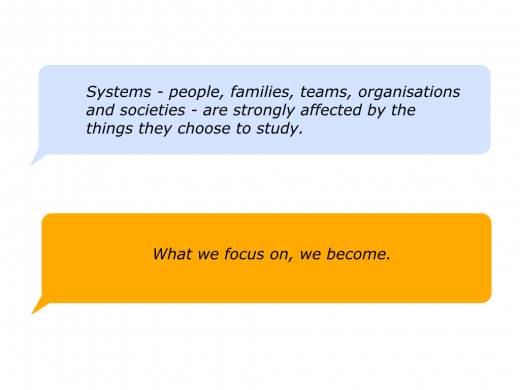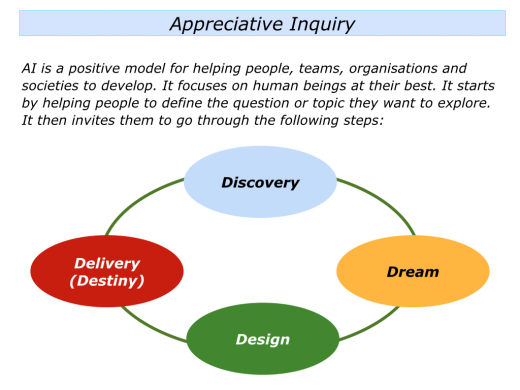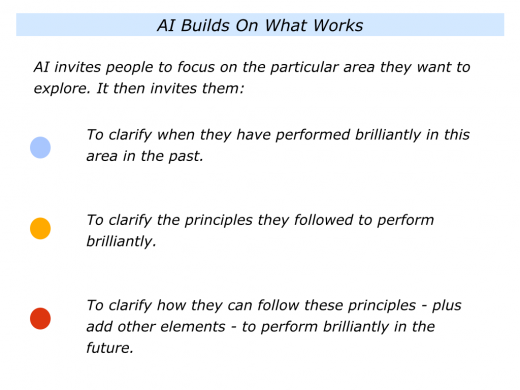David continues to encourage and enable people to develop. Best known for his pioneering work with Appreciative Inquiry, he continues to apply the strengths approach to helping people to achieve success.
In the video above David gives real life examples of how AI can nurture entrepreneurship and create encouraging environments. He shows how it can help to create a sustainable and successful future for the human family.
You can discover more about David’s work on his website. Here is the link.
http://www.davidcooperrider.com/
Appreciative Inquiry
There are many models for helping people, teams and organisations to develop. Appreciative Inquiry is one of the most effective. It is based on what works.
AI studies humanity at its best. It invites people to clarify when they have performed brilliantly – as individuals, teams and organisations. They can then follow these principles more in the future.
AI adopts an organic approach. It asks people to develop, rather than to ‘change’. (Although the outcome may in fact be positive change.)
People believe in the approach. AI shows that they have already done what works. They simply have to do it more – plus maybe adding other elements – in the future. This inspires them to follow the good habits. Here is a short introduction to AI.
David began developing Appreciative Inquiry in the early 1980s. He was later joined by other pioneers, such as Diana Whitney.
At that time he was completing his doctorate by doing organisational development work at The Cleveland Clinic. David began with traditional change management questions, looking at deficits and gaps in performance.
Then something happened. Impressed by the co-operation and innovation he found, David focused more on people’s strengths and professional high points. He became fascinated by studying people, teams and organisations at their best.
David asked the Clinic’s Chairman, Dr William Kiser, if he could focus totally on this positive approach and was encouraged to go ahead. David and his project supervisor, Suresh Srivastva, would later write:

If we study success, for example, we are more likely to feel optimistic, rather than if we study failure. Certainly we can learn from studying how people overcome setbacks. But that is different from digesting a daily diet of failure.
People like the AI approach. They find that revisiting their successes inspires them to build an even better future.
This worked at the Cleveland Clinic. The staff loved learning from their past successes and wanted to follow these principles in the future. People translated these into tackling specific challenges and produced concrete results.
Diana Whitney worked with David on developing AI. They then co-authored the first book on the topic. This was called Appreciative Inquiry: A positive revolution in change.
Since then there have been many other books on the topic. These have often focused on how the approach is translated into action. Here is a short video from Jackie Kelm that provides an introduction to AI.
AI starts by inviting people to define the particular topic they want to explore. They may choose to focus on topics such as:
How can we work well together?
How can we enable our young people to flourish?
How can we develop successful new products?
How can we tap into the creativity in our organisation?
How can we find solutions that – as far as possible – benefit all the stakeholders?
How can we build a superb organisation?
How can we combine our strengths to build a sustainable community?
People then follow the 4D cycle that goes through the stages of Discovery, Dream, Design and Delivery. In the original model the fourth stage is called Destiny. This is to signify that delivering the goals is more than an end in itself.
David Cooperrider describes this in the following way.
The Destiny phase represents both the conclusion of the Discovery, Dream, and Design phases and the beginning of an ongoing creation of an ‘appreciative learning culture.’
Different people apply AI in different ways. Whichever approach they use, however, they invite individuals, teams or organisations to build on their positive core.
This approach can be used with small and big groups. Sometimes it can involve thousands of people. They are asked to share their ideas to help shape the future.
In my own work I have used elements of it when working with organisations in business. Every time people have applied the approach properly they have delivered success.
David has gone on to do many other kinds of work involving AI and strengths. The video below is an excerpt from him sharing some of the many positive things that are happening in the world.








Leave a Reply